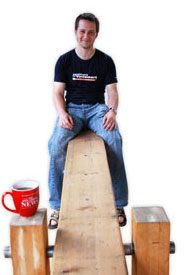Authorship in News, Science, Totter Riding
[Editor's Note: HD, a.k.a. Dave Askins, editor of The Ann Arbor Chronicle, is also publisher of an online series of interviews on a teeter totter. Introductions to new Teeter Talks appear on The Chronicle.]
The Dec. 11, 2009 edition of the scientific journal Molecular Cell includes an article called “Optimizing Protein Stability In Vivo.” It’s a paper co-authored by nine people. The first two names on the list of nine authors are Linda Foit and Gareth Morgan. The paper combines expertise in genetics and chemistry, reflected in the specific strengths of Foit and Morgan, who are two young scientists working in James Bardwell’s lab at the Howard Hughes Medical Institute at the University of Michigan.
Foit’s name might already be familiar to Ann Arbor Chronicle readers in connection with what might be called a “unsuccessful physics experiment” near downtown Ann Arbor – an attempt to achieve greater residential density with a project called The Moravian. Foit addressed the city council in support of the project.
Morgan’s name is certainly familiar to our readers, but he’s no relation to the publisher of The Chronicle, Mary Morgan. Gareth Morgan was visiting Ann Arbor from England for a two-week span recently and will return to Michigan in October for around a month to continue his collaboration with the Bardwell lab.
The fact that Gareth and Linda’s contribution to the paper was equal is made clear through the last of seven footnotes on the author line:
7 These authors contributed equally to this work.
The collaborative nature of modern science was one of the topics that Gareth and I talked about on the teeter totter last Saturday afternoon, just before the University of Michigan football team started its season against the University of Connecticut Huskies.
We also touched on the issue of health and safety culture in U.S. labs compared to British facilities, and the role that game-playing might play in the future of science. For details, read all of Gareth’s Talk. By way of preparation, it might be worth thinking about where it’s easier to drink a cup of coffee – a U.S. lab or a British lab.
I took the occasion of Gareth’s explanation of the credit conventions for a scientific paper as a chance to reflect very briefly on how the allocation of credit is indicated in other lines of work, including journalism. [Full Story]




